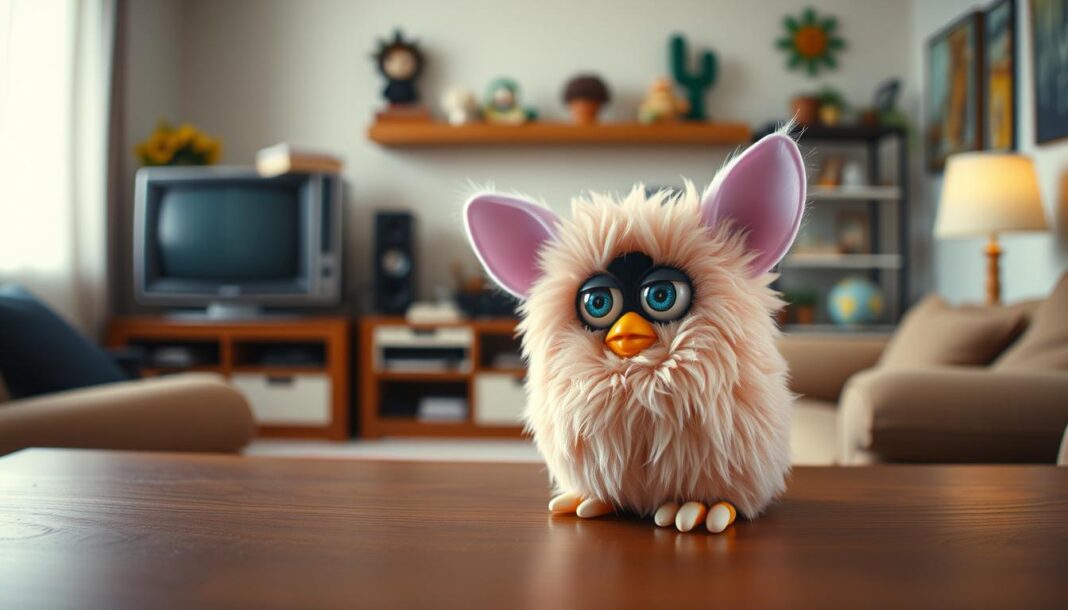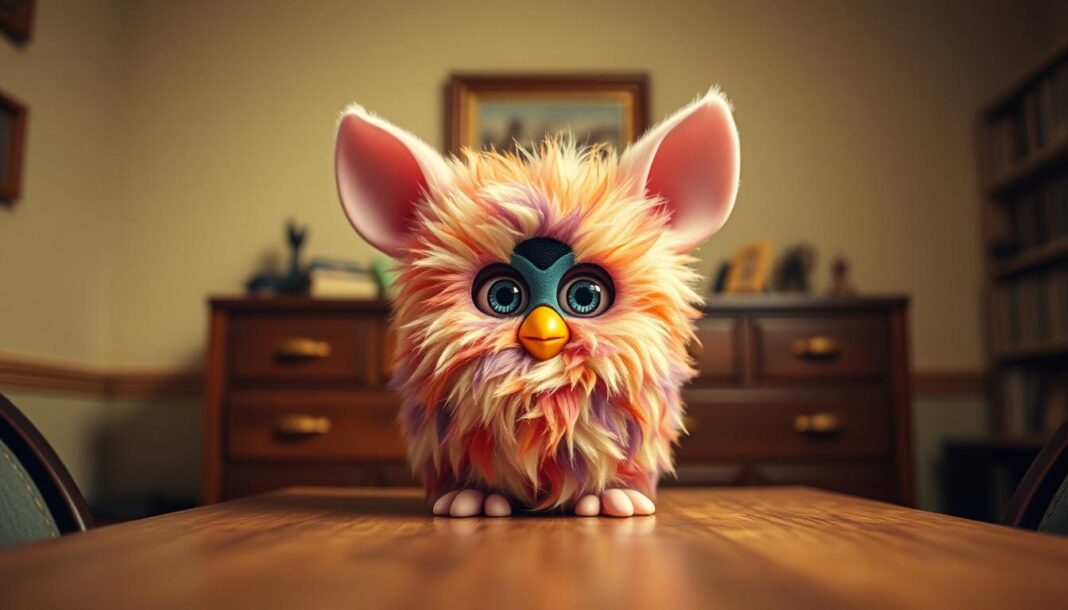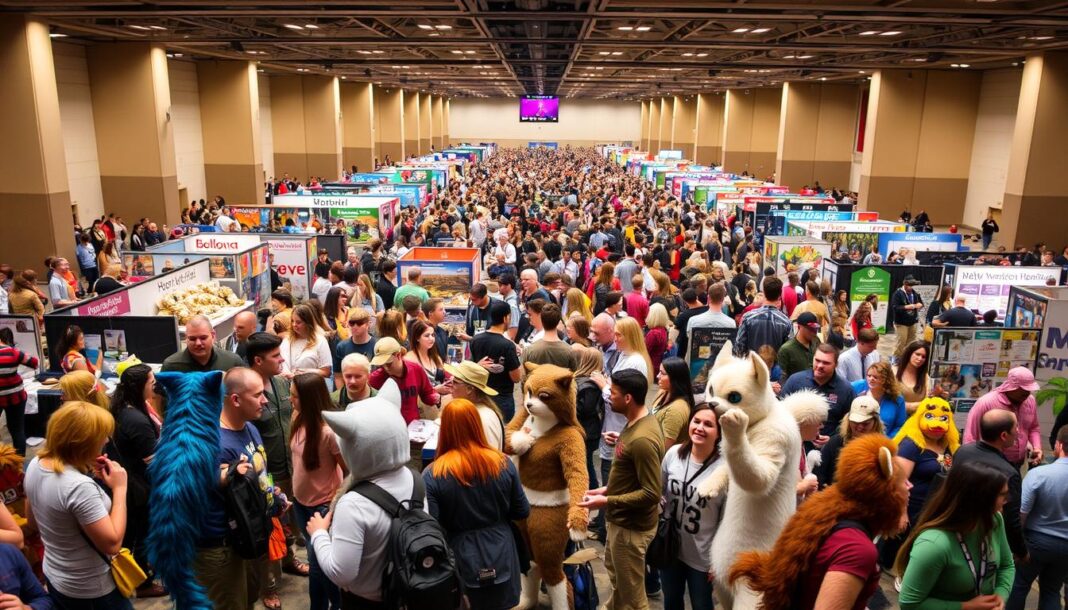In 1998, Tiger Electronics introduced a groundbreaking toy that changed the industry. The Furby became an instant sensation, blending robotics with interactive play. Its unique ability to “learn” English from its native language, Furbish, captivated kids and collectors alike.
The launch year saw 1.8 million units sold, proving its massive appeal. By 1999, sales skyrocketed to 14 million, making it a must-have holiday gift. Over three years, more than 40 million Furbies found homes worldwide.
Translated into 14 languages, the toy’s cultural impact was undeniable. For many, it marked the first successful domestic robot. Dive deeper into the history of Furbies to uncover more fascinating details.
When Were Furbies Made? The 1998 Debut That Started a Craze
Behind every iconic toy lies a team of visionaries—Furby was no exception. The first Furby emerged from a blend of creativity and technical genius, captivating millions. Its journey from sketch to shelf involved bold risks and serendipitous partnerships.
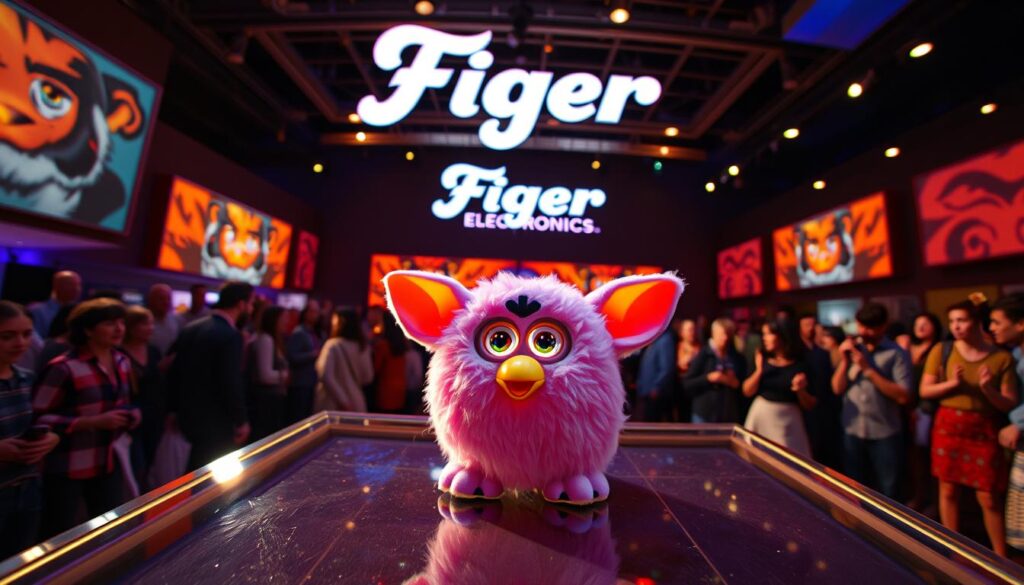
The Creators: Dave Hampton, Caleb Chung, and Richard Levy
Dave Hampton, a robotics engineer, dreamed of an anthropomorphic “fur ball” that could react to its environment. His sketches laid the groundwork. Partnering with toy inventor Caleb Chung, they refined the idea into a child’s “first friend”—a creature that learned and evolved.
Richard Levy, a licensing expert, pitched the prototype to Tiger Electronics. After two rejections, CEO Roger Shiffman saw potential. The team spent 9 months designing prototypes and another 9 perfecting the mechanics. The result? A toy that blurred the line between pet and robot.
Tiger Electronics’ Role in Launching the First Furby
Tiger Electronics gambled on the quirky concept, fast-tracking production for the 1998 American International Toy Fair. The debut stunned attendees, sparking a bidding war among retailers. Priced at $35, the first Furby sold out instantly.
| Milestone | Detail |
|---|---|
| Prototyping | 18 months (design + engineering) |
| Toy Fair Debut | February 1998, New York |
| Retail Price | $35 (scalped for $300+ in 1998) |
| Languages | 14 by launch |
Holiday shortages led to frenzied resales and even counterfeit versions. Yet, the chaos cemented Furby’s legend. Explore the meaning behind Furby’s design to understand its cultural grip.
The Evolution of Furbies: Generations and Innovations
From infrared chatter to Bluetooth connections, Furbies transformed interactive play across decades. Each redesign introduced smarter features, from emotive eyes to app-driven personality tweaks. Here’s how these iconic toys evolved.
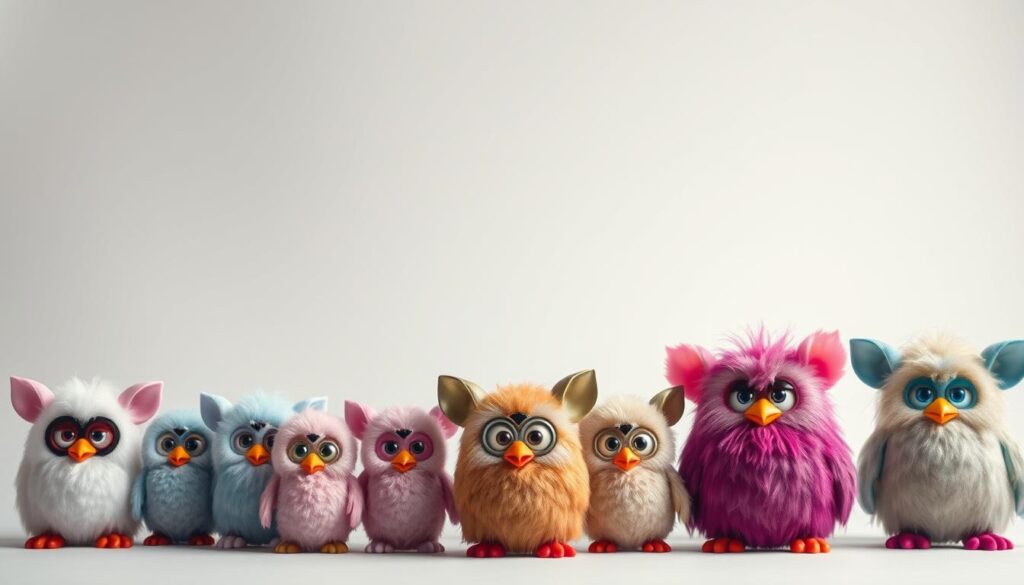
1998–2002: Classic Furbies and Furby Babies
The original 1998 model relied on infrared to “talk” to other Furbies. By 1999, Furby Babies shrunk the design and sped up language learning. These pocket-sized versions transitioned from Furbish to English faster, delighting kids.
2005–2007: Emoto-Tronic Upgrades and Funky Furbies
Voice recognition debuted in 2005’s Emoto-Tronic line. Tilt sensors triggered 40+ reactions, like giggling when upside down. Funky Furbies added wild colors, but the real star was their emotional range—blinking, singing, even “sneezing.”
2012–Present: App Integration and LCD Eyes
2012 models swapped static peepers for expressive LCD eyes. The furby boom (2013) linked to an app, letting users hatch virtual Furblings. By 2016, Furby Connect added color screens and Bluetooth—though connectivity glitches frustrated fans.
| Generation | Key Tech | Languages Added |
|---|---|---|
| 1998–2002 | Infrared, tilt sensors | English, Spanish |
| 2005–2007 | Voice recognition | French, Japanese |
| 2012–2023 | App control, LCD eyes | Russian, Mandarin |
In 2023, Hasbro surprised fans by ditching LCD eyes for hand-drawn designs. Yet the legacy lives on—proof that even quirky toys can shape tech history.
Furby Mania: Cultural Impact and Controversies
Few toys have sparked as much frenzy as the Furby during its 1998 debut. Its blend of interactivity and charm turned it into a cultural phenomenon. From holiday shortages to government scrutiny, the toy’s journey was anything but ordinary.
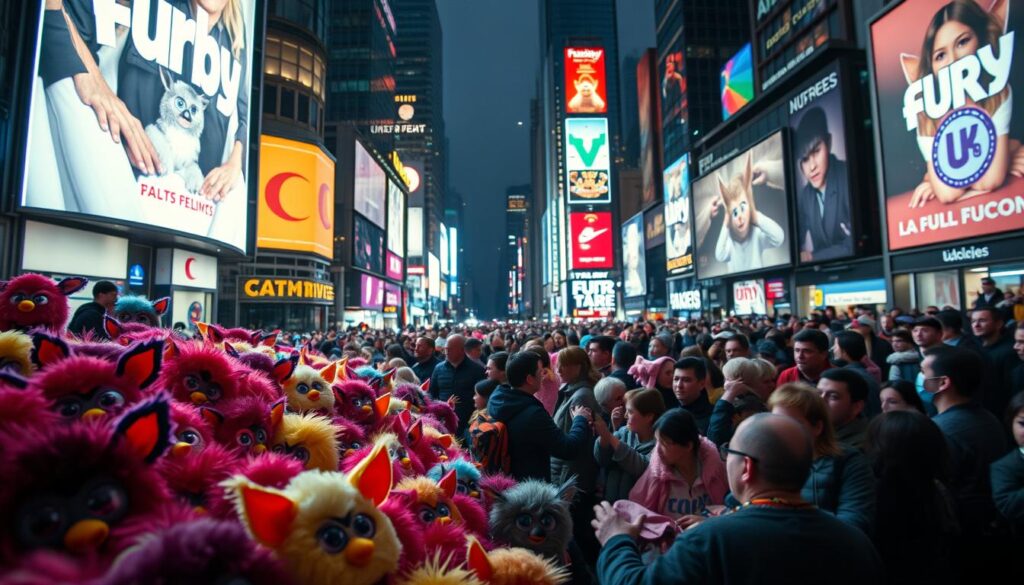
The 1998 Holiday Frenzy and Collector Craze
Demand for Furbies outpaced production within weeks. Stores sold out, and resale prices hit $300—over eight times the retail cost. Rare editions, like the Jester Furby, became holy grails for collectors.
McDonald’s capitalized on the hype in 2000 with Furby-Shelby Happy Meal toys. Meanwhile, fans modded their Furbies, creating circuit-bent versions with eerie voices. The original Furby remains a prized vintage collectible today.
| Furby Mania Milestones | Impact |
|---|---|
| 1998 Resale Peak | $300+ per unit |
| 2000 McDonald’s Collab | Furby-Shelby toys |
| Counterfeit Cases | 500+ reported (1999–2001) |
NSA Ban and the Spy Toy Myth
In 1999, the United States NSA banned Furbies from its facilities. Rumors claimed the toys could record and transmit information, posing a national security risk. Tiger Electronics swiftly debunked this—Furbies lacked recording hardware.
The myth persisted, fueled by the toy’s ability to “learn” English. Yet, the ban only amplified its popularity. By 2000, over 27 million units had sold, proving urban legends couldn’t dent its appeal.
How Furbies Work: Design, Language, and Features
The magic behind Furbies lies in their clever blend of robotics and playful interaction. These toys combined cutting-edge sensors with a quirky language system, creating an illusion of lifelike behavior. From their design to their tech, every detail aimed to surprise and engage.
Furbish to English: The Toy’s Unique Learning System
Furbies “spoke” Furbish—a mix of gibberish and real phrases—like “u-nye-loo-lay-doo?” (translation: “Want to play?”). Over time, they replaced Furbish with English, mimicking language acquisition. This interactivity was powered by:
- A Sunplus SPC81A microcontroller (similar to a 6502 processor).
- The TSP50C04 chip for voice synthesis, using linear predictive coding.
Early models had just 128 bytes of RAM, while 2023 versions support voice commands. Discover more about the original Furby features that started it all.
Sensors and Interactivity: Tilt, Voice, and Infrared
Furbies reacted to touch, sound, and movement. Key features included:
| Sensor | Function | Example |
|---|---|---|
| Tilt | Detected orientation | Giggled when upside down |
| Infrared | Enabled “chatting” with other Furbies | 1998 models used IR ports |
| Motion (2023) | Responded to petting/shaking | Purred or yawned |
Later models added app connectivity, though 2017’s Furby Connect faced Bluetooth security flaws. Despite glitches, these sensors made Furbies feel alive.
Furby’s Comeback: 2023 Reboot and Furblets
Hasbro revived the Furby franchise in 2023 with bold design twists and fresh tech. The new model swapped LCD screens for hand-drawn eyes, focusing on durability and nostalgia. Bundled with a bead necklace and comb, it targeted Gen Alpha’s love for customization.
Voice-Activated Modes and Glowing Ears
Five voice modes and 600+ responses made the 2023 Furby more interactive than ever. A standout new feature was its glowing ears, which pulsed during “meditation mode.” Unlike the Furby Connect, this version required no app, simplifying play.
| 2023 Upgrades | 1998 Comparison |
|---|---|
| Glowing ears, voice commands | Infrared chats, tilt sensors |
| 6 languages supported | 9 languages at launch |
| No app needed | Required IR connections |
Why LCD Eyes Were Removed
Hasbro ditched LCD eyes to cut costs and boost durability. Fans debated the change, but the 2023 model leaned into retro charm with static, expressive designs. This shift mirrored the Furby Boom’s pivot toward tactile play.
The furblets spin-off took portability further. These clip-on pals had no moving parts but came in vibrant colors like coral and EU-exclusive tie-dye. Though less interactive, their backpack-friendly design appealed to younger kids.
Hasbro’s BFF-themed marketing highlighted friendship, a smart move for the latest Furby release date. While tech scaled back, the 2023 reboot proved simplicity could still spark joy.
The Enduring Legacy of a Toy Phenomenon
Over 25 years, the Furby left an indelible mark on pop culture and robotics. With 58 million sold before its 2023 reboot, its popularity spans generations. Films like Uncut Gems and The Mitchells vs. Machines cemented its status as a nostalgic icon.
MIT studies cite Furby as a pioneer in human-robot bonding, inspiring toys like Hatchimals. Its blend of interactivity and charm set the blueprint for modern AI companions. TikTok trends revived interest, pushing 2023 sales targets beyond expectations.
An unreleased film adaptation lingers in production limbo, yet Furby’s legacy thrives. From sparking worldwide mania to shaping tech history, it remains a testament to innovation. Explore its eerie side in the cursed Furby lore—proof that even toys can become legends.
